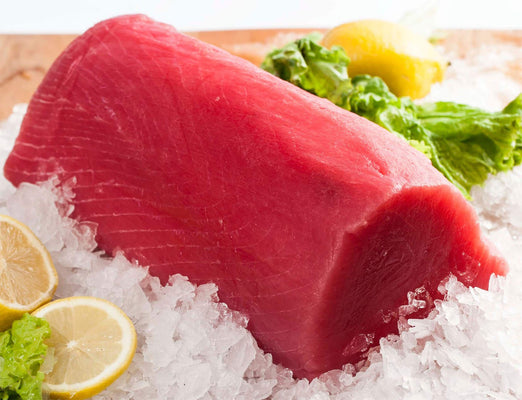This article will illustrate the process of how tuna is made, what it consists of, and if there are any halal ingredients.
Many people have debated whether or not tuna is halal. This article will examine the issue in more depth and answer many of the questions that surround it.
What is Halal?
The word “halal” refers to anything that is permissible under Islamic law. When it comes to food, halal refers to anything that is permissible for Muslims to eat.
There are certain foods that are not permissible for Muslims to eat, regardless of how they are prepared. These include pork and alcohol. Other animals that are slaughtered in a certain way can also have their meat considered halal. That’s why Chewwies focuses on having 100% Halal, Kosher, and contains no animal products.
Tuna is one type of fish that is generally considered to be halal. This is because tuna does not meet the criteria of an animal that is not permissible to eat. However, there is some debate among Muslim scholars about whether tuna is truly halal. Some argue that because tuna is a predatory fish, it should not be eaten. Others argue that because tuna does not have scales, it should not be considered halal.
Ultimately, the decision of whether or not to eat tuna lies with each individual Muslim.
The Origins of Tuna
Tuna is a saltwater fish that is found in all oceans around the world. The name “tuna” comes from the Greek word for thunnos, which means “to rush”. This is fitting, as tuna is known for its fast swimming speeds. Tuna is also one of the most commercially valuable fish in the world, with some species fetching high prices in the fish market.
Interestingly, tuna isn’t a single species of fish, but rather a group of closely related species. The two main types of tuna are bluefin and yellowfin, but there are also many other smaller species. All tuna belong to the family Scombridae, which includes mackerel and bonito.
Tuna is prized for its meat, which is pink or red in colour and has a rich flavour. The meat is high in protein and omega-3 fatty acids, making it a healthy choice for many people. Tuna is often canned and sold as “tuna fish”, but it can also be fresh or frozen and used in a variety of recipes.
Get a free sample pack!What does Tuna Consist of?
Tuna is a type of fish that is found in both the Atlantic and Pacific Oceans. It is a popular food choice because it is relatively inexpensive and easy to prepare. Tuna is also a good source of omega-3 fatty acids and protein.
Most of the tuna consumed in the United States is canned tuna. Canned tuna is usually made from skipjack or albacore tuna. These types of tuna are small fish that are caught in large numbers. As a result, they are often used in canned goods.
Some Muslims believe that all fish is halal, regardless of whether it is wild or farm-raised. However, there is some debate on this issue. Some Muslims believe that only certain types of fish are halal, such as those that have scales and fins. This would exclude tuna, as it does not have scales.
If you are unsure, you can always check with your local imam or Muslim leader for guidance on this issue.

Is Tuna Halal?
The simple answer to that question is yes, tuna is halal. However, there are a few things to keep in mind when purchasing and consuming tuna.
First, it's important to check the source of the tuna. If it's wild-caught, there's a good chance it's halal. However, if it's farm-raised, there's a chance that non-halal feed was used, which means the tuna may not be halal.
Second, even if the tuna is from a halal source, it may be contaminated with non-halal substances during processing or packaging. This is why it's important to check for certification from a reliable Islamic organisation such as the Islamic Food and Nutrition Council of America (IFANCA).
Finally, some Muslims prefer to avoid tuna altogether due to the possibility of mercury contamination. While this is a personal choice, there are many brands of tuna that are low in mercury and safe to consume.
Does it have halal ingredients?
If you're a Muslim considering whether or not to eat tuna, you may be wondering if the fish is halal. While there is some debate on the subject, it's generally accepted that tuna is halal as long as it does not contain any non-halal ingredients.
So, if you're buying canned tuna, be sure to check the label to make sure it doesn't contain anything like pork or alcohol. If you're eating tuna at a restaurant, ask the chef if they use any non-halal ingredients in their dishes.
With a little bit of research, you can easily find out whether or not tuna is halal and enjoy the delicious seafood without worry!
Some Halal Foods That Contain Tuna
There are many halal foods that contain tuna, including some varieties of sushi, sashimi, and canned tuna with soy sauce. However, it is important to check the ingredients of these foods to make sure that they do not contain any non-halal items, such as pork or alcohol.
If you are unsure whether a particular food is halal, it is best to ask a Muslim scholar or your local imam.
Conclusion
There is a lot of debate surrounding the topic of tuna and whether or not it is halal. While there are many different opinions on the matter, the bottom line is that it ultimately comes down to personal preference. If you are someone who strictly follows halal guidelines, then you may want to avoid eating tuna.
However, if you are more flexible with your diet, then you may be able to include tuna in your meals without issue. Ultimately, it is up to you to decide what you feel comfortable eating.


